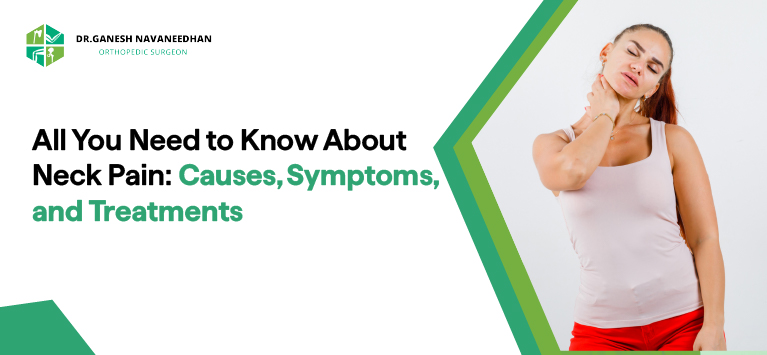- +91 62384 78716 +91 99475 78797
-
Sasthamangalam, Trivandrum
Sasthamangalam, Trivandrum

Small bones called vertebrae to make up your neck and back. The spinal column is created by stacking them on top of one another. Your head is supported by the spinal column, which also shields the spinal cord.
This is the fundamental support structure that connects your body’s extensive network of nerves. This network carries messages that carry feelings like a pain to your brain.
Many people occasionally feel neck stiffness or discomfort. It frequently happens as a result of poor posture, excessive use, or poor sleeping habits. Occasionally, whiplash, contact sports, or falls can cause neck pain.
Neck discomfort often goes away in a few days and isn’t a serious problem. However, in other instances, neck discomfort may be a sign of a serious sickness or injury and call for medical attention.
Seek emergency medical assistance if your neck discomfort is severe, lasts more than a week, or is coupled with other symptoms.
Most people will have neck discomfort at some time in their life since it is so frequent. Neck discomfort typically results from keeping your neck in one position for an extended period of time. However, there are additional factors that may potentially contribute to or cause neck discomfort.
Many people experience a stiff and uncomfortable neck without any apparent cause. After sitting in a draught or suffering a small twisting injury, such as during gardening, it may occur.
The term for this is non-specific neck ache. The most typical sort of neck discomfort, as long as you maintain gently rotating your neck and take breaks as needed, generally goes away after a few days.
With the help of simple stretches and over-the-counter medicines, you can frequently treat brief neck pain episodes on your own. However, it makes sense to contact a doctor or other healthcare provider if your neck issue persists or seriously interferes with your daily activities.
You may feel quite fatigued if you have chronic neck pain and stiffness, especially if your sleep is interrupted. It is not uncommon that you may also start to feel depressed or low in mood. It could be beneficial to discuss your discomfort with loved ones, friends, or your doctor.
The majority of neck pain reasons are not life-threatening and go away over time with conservative medical care. Finding the source and location of the pain is the major factor in deciding on a treatment plan.
Although neck discomfort can be extremely painful and debilitating, many symptoms can be relieved without surgery. In order to give time for healing to take place, the doctor may prescribe drugs to lessen the pain or inflammation as well as muscle relaxants.
Reduced physical activity or the use of a cervical collar can support the spine, limit movement, and lessen discomfort and irritability. Corticosteroids and other trigger point injections can temporarily reduce pain.
Epidural steroids may occasionally be suggested. For six to eight weeks, conservative treatment approaches may be continued.
Seek emergency medical assistance if the patient has any weakness or numbness in their arms or legs. An urgent appointment with a neurosurgeon is advised if the patient has undergone any trauma and is now experiencing neck discomfort accompanied by weakness or numbness.
If conservative measures to manage neck discomfort are ineffective, surgery can be required. Patients could be surgical candidates if:
There are several surgical techniques that can be used; the decision is determined by the particulars of each case. Additionally, there are alternatives for neck approaches from the front or the rear.
Although simple decompression or artificial disc replacement may be used occasionally, spinal fusion is frequently done. A procedure called spinal fusion unites two or more vertebrae solidly.
To support unstable cervical spine regions and improve fusion, various devices (such screws or plates) may be employed. This technique can help to strengthen and stabilize the spine, which might help to relieve severe and persistent neck discomfort.
The characteristics of the disc illness and the existence or absence of pressure on the spinal cord or spinal nerve roots are factors that influence the kind of surgical therapy.
Age, the duration of the patient’s problem, additional medical conditions, and whether or not the patient has undergone cervical spine surgery in the past are further considerations.
Common complaints of neck pain are caused by poor posture and overworked muscles. Consider taking the rest of your neck muscles when they’re stiff, your neck pain will fade away.
Make an appointment with our Orthopedic doctor Trivandrum if over-the-counter medications for neck aches don’t work.
Copyright © 2025 Dr. Ganesh Navaneedhan. All Rights Reserved. | Designed By Harvee healthcare